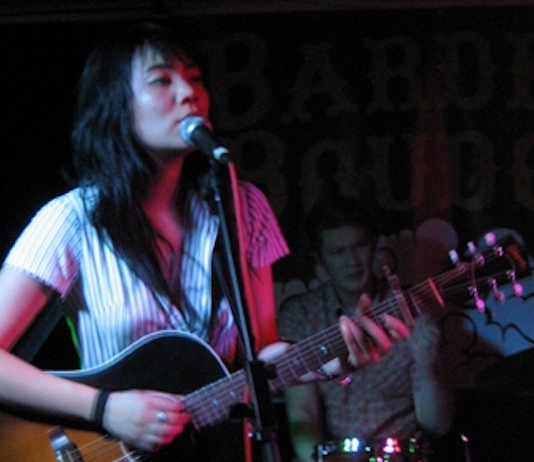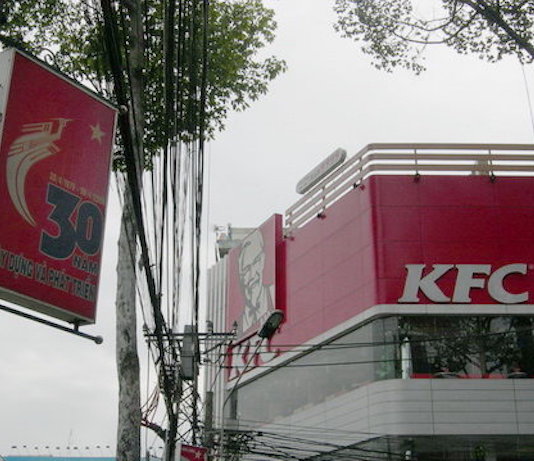
Visit Ho Chi Minh City these days and eventually you will bump into Colonel Sanders. In January 2008, burning-out from the grind of four continuous years in grad school and full of unsatiated wanderlust, I happily made a return trip (only my third) to Vietnam with my father. We weren’t in Vietnam just for kicks, however. My sister was getting married back home in the States that coming summer and my Bà nôi in Sài Gòn was getting closer to her death. The trip then was part trans-Pacific shopping spree for the big wedding and part unspoken final farewell to my aging grandmother. So, between helping my father deliberate over which wedding invitation package would give him the most bang for his đồng and watching Korean soaps dubbed into monotone Vietnamese with my grandma in a frigid air-conditioned bedroom, I didn’t have too many opportunities to explore the city on my own. It was like being under voluntary and not-entirely-unhappy house arrest. At least, I thought, it wasn’t the solitary confinement of my dissertation or the gradschool madhouse.
One day, however, I did manage to break free and go into the city. But soon enough, I was completely lost, trapped on some corner of a busy intersection in the congested heart of Saigon. That’s when I saw him…Or, did he see me first? Colonel Sanders! His smiling benevolent face peered out over the noisy vortex of motorbikes and cars careening into the soup of exhaust fumes, human sweat, and hot metal. Not the eyes of Doctor T.J. Eckleberg over the valley of ashes, but the smile of Colonel Sanders over the rising skyline and sinking water table of HCMC. Patriot and countryman, what are you doing here? My grandmother is dying and my sister is getting married. What are you doing here? Nothing. I never heard his reply, just a dusty droning in my ear. He continued to look blithely and blankly over the city and its multitude. I tried to read the expression on his face, framed inside the large red sign on the side of the two-story Kentucky Fried Chicken – Việt Nam across the street, a KFC bigger and more bloated than any I had seen in all of these United States of America. I followed the Colonel’s eyes. They seemed fixed on something over to my left, across the intersection and electrical wires. What was it? From what I could see, the Colonel appeared to be looking at a bird flying across a red field toward a yellow star. I recognized it as the legendary bird and national symbol called Chim Lạc, once found on the surface of ancient Bronze Drums and now painted on one of the various street signs you could see all over the city celebrating “30 Years of Progress and Development.” Why did the Colonel seem so invested in that sign? What did Chịm Lạc have to do with Gà Rán?
I don’t know how long I stood on that corner across from a KFC in Saigon. I remember suddenly thinking about my grandmother, feeling a little guilty about leaving her for the day in my own selfish act of liberation. My grandmother, who died later that year, experienced so many things in her long life, but did she ever have the experience of eating fried chicken? When I was finishing college and she was still healthy, my grandmother stayed with my family in Wisconsin for six months. Out shopping, she used to point innocently, eyes giggly with amazement, at all the unusually fat, quá mập, American folks. Hungry, I snapped a picture of the famous Colonel, the electrical lines, the gray sky, the mythical bird and the yellow star and tried to recall a favorite poem called “Eating Fried Chicken” from my friend the poet Linh Đinh. I couldn’t remember the entire poem then, but I’ll leave with it now:
I hate to admit this, brother, but there are times
When I’m eating fried chicken
When I think about nothing else but eating fried chicken,
When I utterly forget about my family, honor and country,
The various blood debts you owe me,
My past humiliations and my future crimes—
Everything, in short, but the crispy skin on my fried chicken.
But I’m not altogether evil, there are also times
When I will refuse to lick or swallow anything
That’s not generally available to mankind.
(Which is, when you think about it, absolutely nothing at all.)
And no doubt that’s why apples can cause riots,
And meat brings humiliation,
And each gasp of air
Will fill one’s lungs with gun powder and smoke.
–Hai-Dang Phan
—
Did you like this post? Then please take the time to rate it (above) and share it (below). Ratings for top posts are listed on the sidebar. Sharing (on email, Facebook, etc.) helps spread the word about diaCRITICS. Thanks!









